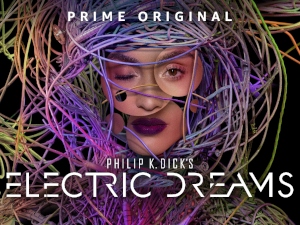“Philip K. Dick’s Electric Dreams” (Amazon Prime) has one of the best opening-credits sequences in recent memory: The music gets tenser and creepier as we see a pregnant man, a chicken-legged woman and a beachgoer walking a cloud on a leash to his mind.
Then PKD himself, despite being deceased since just before “Blade Runner’s” release in 1982, pops into the frame – but the back of his head is all wires: He’s an android.
This imagery is as otherworldly in 2018 as it was when PKD wrote the 10 short stories adapted into “Electric Dreams” in the mid-20th century, but the author’s observations about the steady encroachment of corporatist oligarchies have become more pressing with time.

“Philip K. Dick’s Electric Dreams” (2017)
Amazon Prime, 10 episodes
Creators: Ronald D. Moore, Michael Dinner (based on 10 Dick short stories)
Stars: Bryan Cranston, Steve Buscemi, Geraldine Chaplin
The scriptwriters adapt PKD’s work for the future we now live in, shifting details but keeping the warnings and the Sad Sack Everyman lead character intact.
Filled with lush sets and locales and star-studded casts, these mini-movies (some filmed in the U.S., some in the U.K.) hit more often than they miss, and overall make a fine addition to the PKD legacy. Here are my rankings of the 10 episodes:
1. “Safe and Sound” (adapted by Kalen Egan and Travis Sentell from “Foster, You’re Dead!”)
The story of a teenager, Foster (Annalise Basso), from a bubble city in the Western States starting school in the Eastern States and being exposed to the new world of statist thought is arguably too on the nose. But when I was a teenager, I didn’t understand liberty either; I thought the United States was a bastion of liberty, because that’s what I was taught in public school.
So I sympathize with Basso’s character – the actress also starred in the solid horror film “Ouija: Origin of Evil” – as she gets caught up in her brave new world. While Orwell’s “1984” is an important novel, I think its portrayal of thoughtcrime is a bit off.
While governments can use brute force in a lot of cases, it’ll be awhile before mind-control technology is here. “Safe and Sound,” though, shows that old-fashioned message control is almost as effective; by the end, it drowns out Foster’s own liberty-minded mom (Maura Tierney).
The episode offers subtle moments beneath the blunt theme. Foster’s friend hangs out in a library that was abandoned when Dexes (a future iteration of smartphones) took over, Foster’s notions of slow courtship are laughed at in the East, and people dress colorfully, rather than in drab Communist fashions; wisely, this autocratic state distracts people with the illusion of variety.
Even when Foster lays in a grassy park on a beautiful day, the ants on the trees are spy devices.

2. “The Commuter” (Jack Thorne, same title)
As Sad Sack Everyman Ed, Timothy Spall (Peter Pettigrew in the “Harry Potter” films) totally sells this timeless episode by Thorne, the writer of the “Harry Potter and the Cursed Child” stage play.
It contrasts the dire life of a train-station ticket-seller in the big city with the archetypal homey small town that exists in our minds – but also as a magical reality here. (In another “Harry Potter” parallel, passengers jump off and get on the train between two scheduled stops to reach Macon Heights.)
When Ed must choose between the ideal (but predictable) life and the real (but messy) life, it had me mulling which I would select as well.
3. “Impossible Planet” (David Farr, “The Impossible Planet”)
This is more of a beautiful tone poem than a message piece. Through old woman Irma (Geraldine Chaplin) and young man Norton (Jack Reynor, an Irish answer to Chris Pratt) who are dream-linked, we soak up the melancholy notion that the Earth has been destroyed and can never be visited again. (Norton and his shiftier colleague take Irma to a closer planet, claiming it’s the dead Earth.)
Because Irma wants to specifically visit the blue springs of “Carolina,” where her grandmother grew up, the piece hits an emotional chord lacking from Asimov and Clarke tales where the Earth is a dead, abstract concept.
4. “The Hood Maker” (Matthew Graham, same title)
The short story was a rough prototype of sorts for “Minority Report,” and this is the only “Electric Dreams” episode that plays like a series pilot. If it was, I’d be more keen on it than the actual “Minority Report” TV series from a few years back.
Agent Ross (Richard Madden) and his new partner, the telepath Honor (Holliday Grainger), go through the proscribed motions of arresting people for their thoughts, but this grim job is balanced by Ross’ growing compassion for Honor, whose telepathy causes a facial scar and makes her a member of a hated class. Not simply a government mind-reader, she’s a cog in a cycle of mistrust.
5. “Kill All Others” (Dee Rees, “The Hanging Stranger”)
Philbert Noyce (Mel Rodriguez, Todd on “The Last Man on Earth”) is worried about The Candidate’s (Vera Farmiga) platform of killing all “others.”
Of course, his interest soon gets him labeled as an “other,” but lack of surprises aside, the episode works because of its parodic tone, from Mexuscan’s one-party system, to the way the “kill all Others” plank is downplayed by the collaborative media, to the way Philbert’s friends are immediately distracted by a soccer game right after The Candidate’s patriotic speech about the importance of killing all Others.
6. “Crazy Diamond” (Tony Grisoni, “Sales Pitch”)
If you need one actor to play a prototypical PKD protagonist, Steve Buscemi perfectly fits the bill. It’s a pleasure to watch him as Ed, who gets disgruntled with his pre-planned society in a fashion reminiscent of “Ghost World.” He can’t plant a garden because there’s cement a few inches below the ground everywhere.
This wouldn’t be a big deal except that his government-proscribed groceries have started to spoil quickly. Also peppering in genetic engineering via human-pig hybrids (who are bred to not take offense to insults), “Crazy Diamond” is an effective think-piece on the mirroring of entrepreneurial entropy and lifestyle entropy.
7. “Autofac” (Travis Beacham, same title)
An earthy Juno Temple propels this story of resistance fighters in a future where much of the population has been wiped out but an automated factory churns on. It produces goods that aren’t essential for a post-bomb society, but uses precious resources and further poisons the environment.
Poisonous-factory fears are becoming outdated, and the fear of robots is the most overrated theme in sci-fi, so – despite Janelle Monae’s turn as a poor man’s “Ex Machina” robot – I rank this episode lower than most viewers do.
8. “Real Life” (Ronald D. Moore, “Exhibit Piece”)
In a short story that might have inspired the TV series “Awake,” Sarah (Anna Paquin, currently starring in “Bellevue”) and George (Terrence Howard) are the same person, living the same life, in different realities: One’s waking hours are the other’s dreams.
The excellent leads and the high production values – Sarah’s apartment window looks upon a vista of clean skyscrapers and flying neon-lit cars – bode well, but the mystery of which reality is real is a drawn-out guessing game.
9. “The Father Thing” (Michael Dinner, “The Father-thing”)
Due to its simple body-snatching story, this was never one of my favorite PKD short stories, and the adaptation is unavoidably padded. Jack Gore does a fine job as a Spielbergian kid who knows what’s really going on, I can’t argue with Greg Kinnear and Mireille Enos (“The Killing”) as the parents, and the early father-son chats about baseball are enjoyable. But once the body-switch happens, we’re in very familiar territory.
10. “Human Is” (Jessica Mecklenburg, same title)
I feel bad putting any episode in last place, but similar to “Father Thing,” this one just has two story chunks. Initially, a military husband (Bryan Cranston) treats his wife (Essie Davis) like garbage. After a not-so-mysterious alien body switch, he treats her nicely. The nature of translation from page to screen makes this story come off too bluntly.

